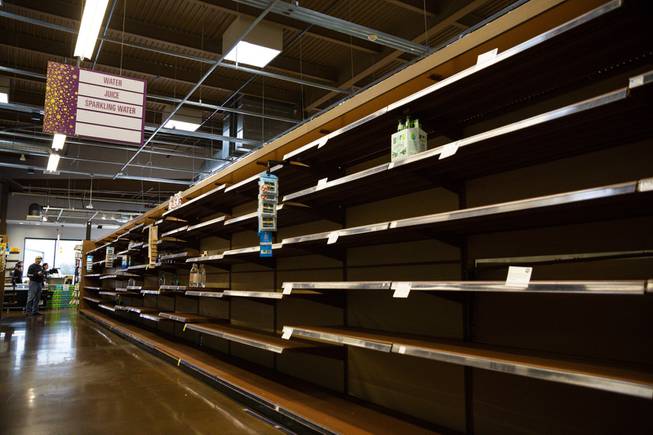
Sun Staff
Shelves are seen empty at a grocery store on the first day of the COVID-19 shutdown, Wednesday, March 18, 2020.
Friday, March 20, 2020 | 4:17 p.m.
Related Content
The Nevada Attorney General has received nearly 100 calls and complaints from Nevadans relating to coronavirus scams, including reports of inflated prices for in-demand items.
Price gouging — selling items in high demand at a higher than usual price — is illegal in Nevada. Officials across the country say it is on the rise during the coronavirus pandemic, especially for items like hand sanitizer, paper towels and certain food items.
The Attorney General’s Office and the Bureau of Consumer Protection are monitoring and investigating complaints that violate consumer protection laws, Attorney General Aaron Ford said in a statement. This includes price gouging of goods and services, customer intimidation during sales and the promotion of items that claim to “cure” or treat coronavirus.
“Though Nevada does not have a price gouging statute, we’re able to look into reports of coordinated price increases, increased consumer prices, making false representations, and the use of intimidation tactics during a transaction through a general fraud and antitrust lens,” Monica Moazez, communications director for the Attorney General’s Office, wrote in an email. “These laws provide for a range of penalties and we will be reviewing each complaint on a case by case basis.”
Most of the complaints sent to the Attorney General have come from Southern Nevada, Moazez said. Complaints of cleaning and health supplies and water sold at inflated prices have been most common so far, she said.
In Las Vegas, people have taken to social media to share incidents of possible price gouging at grocery stores and convenience stores. One person posted a photo on Twitter of a 24-pack of 20-ounce water bottles for $28.56 at a convenience store. The store replied on Twitter to say it was investigating the incident.
Others have reported high-priced rolls of toilet paper and paper towels at grocery stores across the valley. However, some have indicated that they were unsure whether a high-priced good constitutes “price gouging” or not.
The key is to compare it to past prices of the same item at that particular store, Moazez said.
“If you suspect something is priced at an extraordinarily high value, we encourage consumers to run a quick search or consult their prior receipts or bank statements for these items,” she wrote in an email.
At this point, Moazez said she was unable to confirm whether any businesses have been prosecuted or fined. But the office has been sending letters to businesses flagged by residents, she said.
Those who believe they are a victim of price gouging or other scams relating to the virus should call the Bureau of Consumer Protection hotline at 888-434-9989. People can also file complaints with the Attorney General’s Office online, or through the Federal Trade Commission’s website, according to the office.
Consumers should avoid clicking links in emails or messages from unfamiliar addresses, be skeptical of messages from senders claiming to be the Centers for Disease Control or to offer treatments and cures for coronavirus, and research charitable organizations prior to donating to them, according to the Attorney General’s Office.
